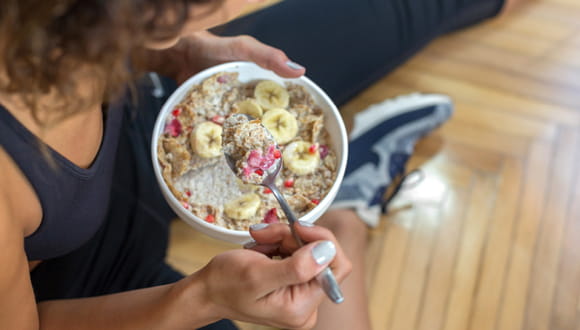By Kate Andropoulos
You've been logging miles, visualizing your race and counting down the days until you line up at the starting line. But could nutrition be the missing piece in your marathon performance puzzle?
Nutrition is the key to optimizing your run, according to Monica Bearden, a registered dietitian and sports nutrition consultant at Houston Methodist.
"Research shows that having full muscle glycogen stores and being well-hydrated at the start of a marathon, along with a nutrition and hydration strategy during the race, supports energy and performance over the race's duration," says Bearden. "After pushing performance, the body needs to rehydrate, recover and rebuild."
Bearden offers expert guidance on how to approach your nutrition before, during and after your marathon.
What to eat before a marathon
Carb-loading — an increase in carbohydrate intake to load up muscle glycogen, the storage form of glucose made up of carbohydrates — is important before a marathon. It can continue all the way up until the event, notes Bearden.
"Eating enough carbohydrates prerace will allow runners to start and finish strong," says Bearden. "The night before and on race day, carbohydrate sources should be low in fiber. Additionally, race day meals should focus on carbohydrates with a modest amount of protein and low fat."
"Runners should practice their race-day nutrition and hydration plan" to ensure a smoother racing experience, adds Bearden. To help maintain hydration as you run, make sure to drink eight to 16 ounces of water, one to two hours before the race.
How to fuel during a marathon
According to Bearden, formulating a solid nutrition and hydration plan for your race is crucial.
"Taking in energy, electrolytes and fluids in the correct amounts is associated with better performance," says Bearden. "It will help you avoid temperature regulation problems; 'hitting the wall,' or not being able to finish the race for lack of energy; and affected concentration that can result in an increased perception of effort."
To fuel performance, runners should consume 60 to 90 grams of carbohydrates per hour from multiple carbohydrate sources for better absorption. "Choice endurance supplements contain a variety of carbohydrate sources, such as sucrose, fructose, dextrose and/or glucose," says Bearden.
These energy sources can come in powder form added to water with electrolytes as well as in solid form. If you choose a powder source, it's important to follow all label directions regarding the ratio of powder to water.
"Too many solutes in the water can cause gastrointestinal distress," advises Bearden.
(Related: 5 Tips for Avoiding Gastrointestinal Distress on Race Day)
Your nutrient intake should be spaced out over each hour of your race, with a recommended rate of consumption of about 15 to 22 grams of carbs per 15 minutes.
How to refuel after your run
Although your race is over, it's important to keep your nutrition choices top of mind as your body recovers from exertion.
"As far as recovery, sports nutritionists use the three Rs: rebuild, refuel and rehydrate," says Bearden. "Fluids, calories and macronutrients — specifically protein and carbohydrates — as well as micronutrients help to replenish muscle glycogen and build stronger muscles and bones post-marathon."
You can begin your marathon recovery process as soon you cross the finish line by rebuilding and refueling through nutrition.
"Muscle glycogen stores should be replenished by eating 1.5 grams of carbs per kilogram of body weight within 30 minutes of completing the race and again two hours later," says Bearden. "For optimal rebuilding, each meal should contain between 20 to 30 grams of protein."
Bearden recommends high-quality animal-based or soy protein sources for their high biological value (meaning they are absorbed and used efficiently by the body) and because they contain the complete amino acids needed for ideal post-exercise protein synthesis. If you want to choose all plant-based proteins for your recovery meals, Bearden recommends combining protein sources to consume complete essential amino acids, such as brown rice with beans.
When planning your recovery meals, focus on combining protein with quality carb sources, such as whole grains, fruits and vegetables.
"These nutrient-rich sources contain fiber, antioxidants and a variety of vitamins and minerals needed for optimal recovery for your muscles and bones," advises Bearden. "A recovery meal can be as simple as a peanut butter and jelly sandwich on whole wheat bread, two pieces of fruit, a bag of pretzels, a granola bar and a glass of skim milk."
As you think about your marathon recovery, don't forget the importance of replacing the fluids you've lost through rehydration. Rehydration should take place over the course of six hours following the completion of your race.
"All athletes should weigh themselves before and after racing to know how much fluid needs to be replenished," says Bearden. "The recommendation is to drink 16 to 24 ounces of fluid per pound of body weight lost."
By ensuring you have a solid nutrition plan in place, you're laying the foundation for a peak marathon performance and an easier post-race recovery process.


